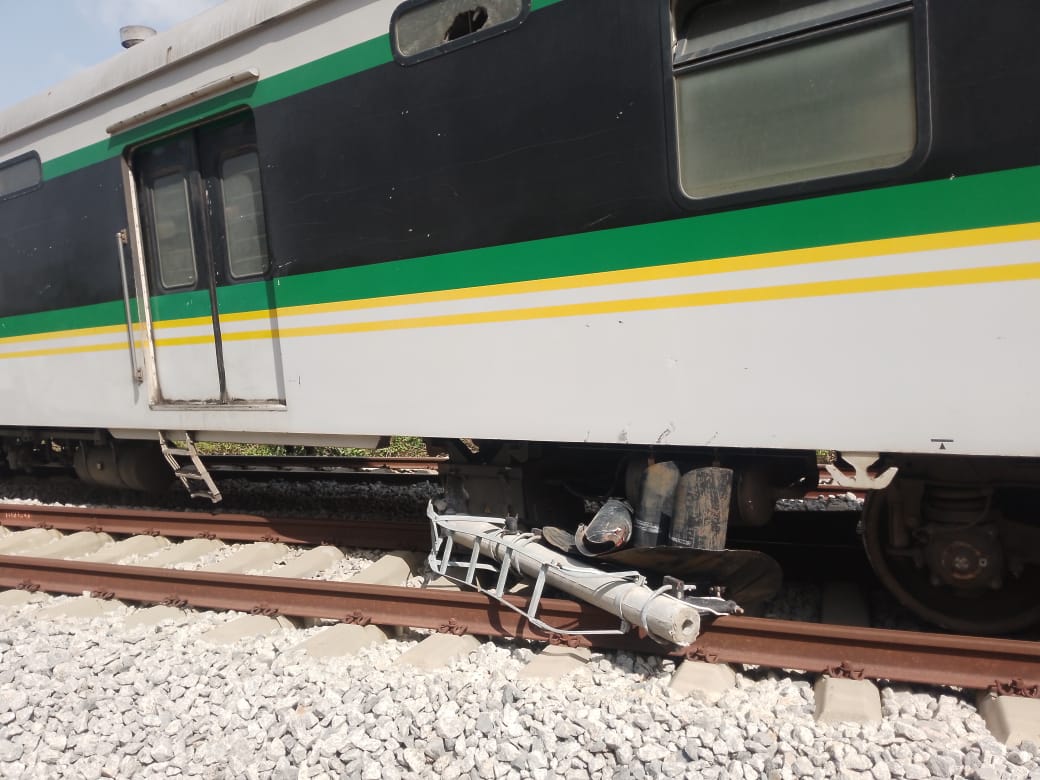Let us stop train derailment
The Nigerian Railway Corporation (NRC) was in the news again. And it was not in celebration of unique and quality service, it was the derailment of its Abuja-Kaduna train. On June 12, 2024, a Kaduna-bound train from Abuja derailed. A week earlier, on June 5, 2024, the train had derailed at Asham station in the […]

Derailed train
The Nigerian Railway Corporation (NRC) was in the news again. And it was not in celebration of unique and quality service, it was the derailment of its Abuja-Kaduna train. On June 12, 2024, a Kaduna-bound train from Abuja derailed. A week earlier, on June 5, 2024, the train had derailed at Asham station in the Federal Capital Territory (FCT), just less than 30 minutes after it departed from the Kubwa station. After three hours of being stranded, the passengers were returned to Abuja and left to get alternative means of transportation or postpone their trip.
On Thursday, June 6, Yakub Mahmood, the deputy director of the Public Relations Department of the NRC, said the derailment was caused by vandals who removed track fastening clips.
On May 26, 2024, a train that departed Rigasa station in Kaduna for Abuja derailed in a mountainous area near Jere. Three carriages were said to have gone off the tracks, but there were no casualties.
On January 27, 2023, two months after resumption of services on the Abuja-Kaduna train route, the NRC suspended services due to a derailment at the Kubwa station. It only resumed four days later.
On March 28, 2023, the NRC suspended operation due to an attack on the Abuja-Kaduna train, which witnessed the kidnap of over 60 persons and the death of eight people. It later resumed operation eight months after the incident, on December 15, 2022, after those kidnapped were freed.
In January 10, 2019, one person died and hundreds of passengers escaped death when an Apapa-bound mass transit shuttle train skidded off its tracks, derailing in the early hours at the Ashade railway crossing on the Agege-Ikeja corridor in Lagos.
Indeed, derailment has been the predominant type of train accident in Nigeria. The National Bureau of Statistics (NBS), 2023 Social Statistics Report, which examined socio-economic developments from 2020 to 2022, recorded 183 derailment incidents, with 57 in 2020, 61 in 2021 and 65 in 2022.
Loss of control and locomotive failure were the second most common causes of train accidents, with 155 incidents recorded between 2020 and 2022. The third major type of train accident was detachment, with a total of 51 incidents over the same period. Additionally, the report noted 9 accidents related to washouts, 28 collision incidents and 41 accidents due to miscellaneous activities.
The data highlights the urgent need for improved safety measures and infrastructure maintenance in the Nigerian railway system to prevent such accidents. Of course, every derailment causes disruption in the lives and schedules of the passengers as it leaves them stranded. It is also a loss of revenue for the NRC as other scheduled train services are delayed or cancelled.
We find the derailments objectionable as they are looming disincentives that could discourage Nigerians from patronising trains. It is also unacceptable as it not only makes the NRC to lose money, it denies its passengers value for money spent. Therefore, we call for inbuilt compensation for passengers whenever they are victims of train derailment.
Security personnel from various agencies should always be on hand to cordon off the area and maintain law and order while the injured are rushed to hospitals in the neighbourhood for treatment. Security and surveillance operations should be a constant aspect of operation on the rail tracks. In addition to this, there should be the human element of concretely engaging the inhabitants of communities along the train route in helping to secure the right of way. That way, they can take part in the ownership of the train services that run through their communities.
We must hasten to add that these measures should not be limited to the Abuja-Kaduna route; they should be extended to the Lagos-Ibadan and Itakpe-Warri routes and serve as the template for other rail routes now under consideration.
Moreover, all cases of train derailment must be investigated, arrested and perpetrators prosecuted to the full extent of the law.
The Nigerian Safety Investigation Bureau (NSIB) should release the reports of their investigations into train derailments in order to aid the rail authorities in putting a stop to the menace. The incidents are becoming too many compared to the number and regularity of services they offer across the country.
We at Daily Trust, therefore, call for concerted efforts towards preventing train derailment. The NRC must ensure that train wheels and their components are kept within the right temperature, with functional sensors that should make train derailment uncommon.
